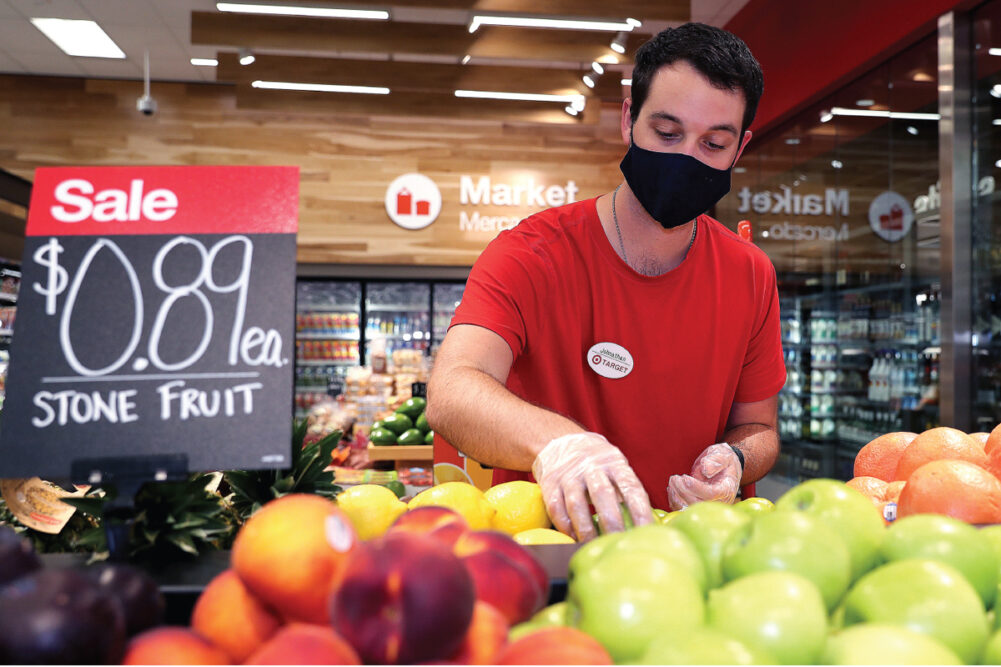MINNEAPOLIS — A day after Walmart, Inc. posted strong results, Target Corp. released earnings that management described as “unprecedented,” “strongest” and “remarkable.” New income for the second quarter of fiscal 2020, ended Aug. 1, totaled $1.7 billion, equal to $3.38 per share on the common stock, 80% higher than the same period during the previous year.
Quarterly sales rose 25% to $22.7 billion.
“The results we reported this morning are truly unprecedented,” said Brian C. Cornell, chairman and chief executive officer, during an Aug. 19 conference call with securities analysts. “On the top line, we delivered second-quarter comparable sales growth of 24.3%, the strongest we've ever reported. Equally remarkable on the bottom line, we generated adjusted EPS of $3.38, a new record high and strong enough to offset the significant profit headwind we faced in the first quarter.”
Store-originated comparable sales rose 10.9% and digital comparable sales surged nearly 200% during the quarter. The retailer experienced the greatest digital growth in same-day offerings for in-store pickup, drive up and Shipt.
“It's worth pausing to acknowledge that at just under 11%, this store-only comp stacks up as one of the best in our history and yet, it happened at a time when American consumers are adopting digital shopping like never before,” Mr. Cornell said.
Breaking down digital sales by channel mix, same-day services experienced 279% comp growth, drive up grew 734% and sales fulfilled by Shipt were up more than 350%, according to the company.
The increased scale of Target’s digital business led to greater efficiencies with reduced costs.
“As a store's drive up order volume increases, more and more of the time, our team is able to pick multiple orders together, gaining efficiency in the pick process,” said John Hurlbert, vice president of investor relations. “In addition, we realized a similar benefit in the parking lot where our teams are increasingly delivering multiple orders at a time, reducing the cost per order of that delivery trip to the parking lot. And finally, as we've seen meaningful trip consolidation this year, we realize a benefit as fixed order costs are spread across more items.”
All of the benefits combined reduced second-quarter average unit costs for digital fulfillment approximately 30% over a year ago, Mr. Hurlbert said.
Food and beverage comp sales rose 20% during the quarter, slightly slower than the first quarter when consumers were stocking up as the pandemic emerged. Target launched its Good & Gather store brand in Sept. 2019 and it has exceeded $1 billion in sales, Mr. Cornell said.
“With the momentum from this new brand, our own-brand Food & Beverage business has been growing more than 30% so far this year, significantly outpacing the market and growing market share,” he said. “Beyond Good & Gather, we continue to benefit from an unmatched portfolio of owned and exclusive brands that spans our entire assortment. Together, these brands whose sales have outgrown national brands so far this year, offer guests quality and style at an unmatched value while enhancing Target's differentiation and delivering attractive gross margin rates.”
As consumers stocked up during the first quarter the retailer suspended initiatives deemed non-essential, such as adding fresh, refrigerated and frozen products to the pickup and drive up services. The program was restarted as demand eased and is now in more than 1,500 stores.
“In addition, we've added adult beverages to our pickup and drive up assortments and more than 300 stores in selected markets,” Mr. Hulbert said. “And we'll continue the rollout of both perishable items and adult beverages to additional locations next year.”
Management did not provide guidance but did note there have been wide swings in sales between May and August.
“May was by far the strongest month with a 33% comp, followed by June at 21%, and July at about 20%,” said Michael J. Fiddelke, chief financial officer. “And so far in August, due largely to softer sales in our back-to-school categories, month-to-date comp sales have been running in the low double digits.
“A double-digit increase is still quite strong in the context of history, but a 20 percentage point spread between our May and August to date comps is an incredibly wide swing within a few months, highlighting the difficulty of forecasting our business right now. So, given that our Q1 performance was not a good predictor of our second-quarter results, our Q2 results should not be viewed as a predictor of our performance going forward. And given that we can't eliminate uncertainty in the environment, we continue to place a premium on flexibility in our plans.”
For the first six months of fiscal 2020, Target net income rose 14% to $2 billion, equal to $3.94 per share.
Sales jumped 18% to $42 billion.





